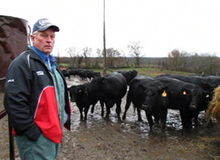Heartbreak for cattle farmers and butchers
By Steph Crosier

STIRLING, 31/10/2012. Dale Grant, owner and operator of Gran-Jou Farms, knows that he will be short hay this winter for his cattle. He will sell some cattle to make the difference. Photo by Steph Crosier
After days of rain, cattle are sloshing through mud in search of some food. The massive black beasts call out loudly to each other as Dale Grant’s son, Mark, drives a tractor with a giant bail of hay through the muck. But Grant of Gran-Jou Farms knows that he won’t have enough hay to last the winter.
“The pastures were running out so that took up a good part of our hay supply Normally we don’t have to feed the cows hay in the summer time,” said Grant. “So that’s just going to stretch our hay supply.”
Grant doesn’t want to buy outside hay because the cost is too expensive. To adjust and make his hay last he knows he may have to sell some of his cattle during the winter at a lower price.
“Usually we have some hay to sell,” said Grant. “But not this year.”
Grant says he’ll keep his best cattle to sell in the spring at a higher price.
“The price of beef is going to have to come up to pay the difference between the feed costs,” said Grant. “ Last year when I was weaning the calves, I was paying $158/ton for feed. This year its around $330/ ton. And that’s just a protein ration, just the cheapest ration I can buy.”
In Trenton. at the Farmers Market owner and operator Alex Berry has had to lay off an employee due to the cost of beef and the XL Foods E.coli recall in the month of October.
“We had to cut back staffing, which cuts back on overhead that’s the major things we had to do,” said Berry. “We can’t cut back on hydro and that so yes we’ve had some layoffs.”
Berry orders his beef from major feedlot suppliers in the southern states, western Canada, and in the past XL Foods. He said it has been difficult with both the drought and the recall all in the same season.
“Its a little bit of a double whammy,” said Berry.
Though sales have been down, Berry said that there are customers coming in because they love their meat. The XL Foods recall was one of the largest beef recalls in Canadian history. First found in ground beef it was then found in steak pieces when XL tenderizers forced E. coli into the meat.
The Farmers Market has their own tenderizer on site but customers are still wary, he said.
“People have been keeping more aware of the whole process of beef production, it’s made some people nervous,” said Berry.
Berry said the drought has forced him to raise the cost of meat up to $2/lb.
“But that is kind of across the board for everybody, we’re all in the same boat,” said Berry. “People still like their meat and will still buy their meat, they just need to pay a little more for it.”
Berry said the only consolation is the lack of customers and higher prices isn’t happening during barbeque season.
“Better to lose 10 or 20 per cent of the slow business than 10-20 per cent of the peak business in the summer.”
 Print This Post
Print This Post






